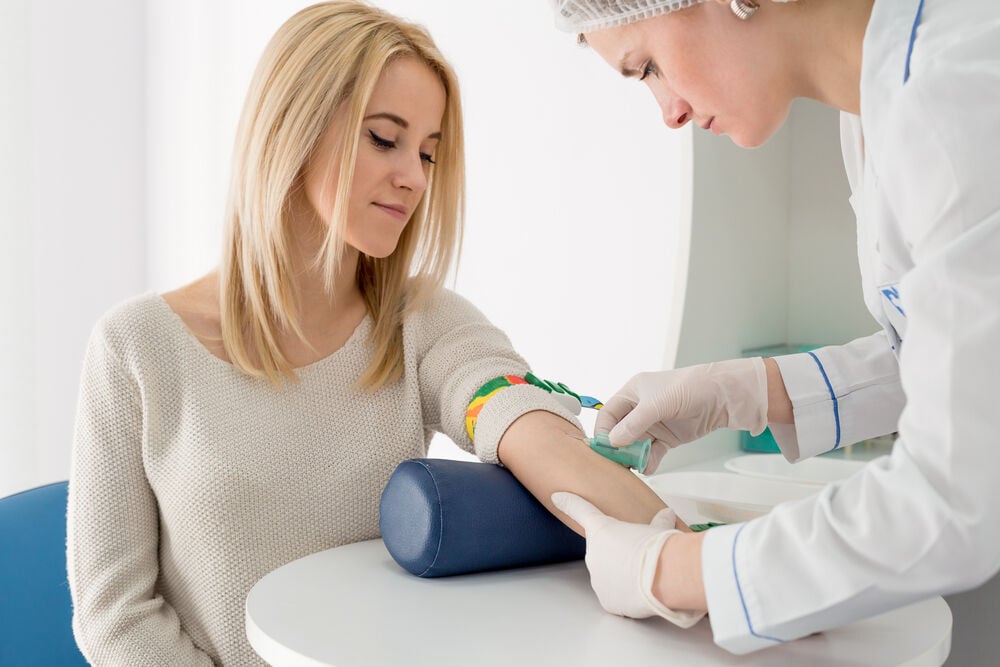-
Tracking cycle
-
Getting pregnant
-
Pregnancy
-
Help Center
-
Flo for Partners
-
Anonymous Mode
-
Flo app reviews
-
Flo Premium New
-
Secret Chats New
-
Symptom Checker New
-
Your cycle
-
Health 360°
-
Getting pregnant
-
Pregnancy
-
Being a mom
-
LGBTQ+
-
Quizzes
-
Ovulation calculator
-
hCG calculator
-
Pregnancy test calculator
-
Menstrual cycle calculator
-
Period calculator
-
Implantation calculator
-
Pregnancy weeks to months calculator
-
Pregnancy due date calculator
-
IVF and FET due date calculator
-
Due date calculator by ultrasound
-
Medical Affairs
-
Science & Research
-
Pass It On Project New
-
Privacy Portal
-
Press Center
-
Flo Accuracy
-
Careers
-
Contact Us
Prenatal Testing Checklist: Regular Tests for Each Trimester


Every piece of content at Flo Health adheres to the highest editorial standards for language, style, and medical accuracy. To learn what we do to deliver the best health and lifestyle insights to you, check out our content review principles.
Recommended schedule of prenatal visits
If you're lucky to have a healthy pregnancy, your healthcare provider will probably want to see you on the following schedule of prenatal visits:
- Weeks 4–28 — once a month
- Weeks 28–36 — once every 2 weeks
- Weeks 36–40 — once a week.
The first trimester (weeks 1–13)
Significant changes are occurring in your body. This is when you are likely to make your first prenatal appointment. Here is what it will involve:
Having a detailed conversation with the doctor
- Taking a pregnancy test
- Undergoing a pelvic exam
- Measuring your pelvis
- Undergoing a comprehensive physical check-up (the doctor will measure your height, weight, and blood pressure, analyze your breast shape, and examine your back and anterior abdominal wall muscles and scars caused by injury or surgery, if any).
First trimester laboratory tests
- Complete blood count
- Blood type and Rh factor testing
- Urinalysis
- Urine culture test
- Blood testing for rubella, hepatitis B and C, and human immunodeficiency virus (HIV)
- Testing for sexually transmitted infections.
Mandatory first trimester screening
These screeners are primarily aimed at determining the likelihood of the fetus developing congenital defects (for example, heart disorders) and chromosomal abnormalities (Down’s syndrome, Edwards syndrome, etc.).
- Ultrasound screening (week 11–16)
The ultrasound is used to determine gestational age, the number of fetuses, and the location of the chorion (the future placenta); as well as assessing uterine anatomy, measuring nuchal translucency (changes may indicate developmental defects), etc.
- Blood tests
- Measuring the level of pregnancy-associated plasma protein A (PAPP-A) in the mother’s blood. This is the main biochemical marker for Down’s syndrome in the first trimester.
- Measuring the level of human chorionic gonadotropin (hCG) in the mother’s blood. HCG is a pregnancy hormone produced by the chorionic tissue soon after implantation of the embryo.
If the first screening results are outside the normal range, the doctor may recommend genetic counseling, which could be followed by diagnostic testing.
- Chorionic villus sampling (weeks 10–12) involves examining chorionic tissue samples taken with a needle through the anterior abdominal wall or cervical canal under ultrasound control.
- Non-invasive prenatal genetic testing (after week 10) is aimed at detecting fetal DNA fragments in the mother’s blood plasma.
Take a quiz
Find out what you can do with our Health Assistant

The second trimester (weeks 14–27)
As your pregnancy progresses, your body has adapted to its new state, but seeing the doctor and following their instructions are still important.
Don’t forget to:
- Visit the dentist to rule out any teeth and gum problems.
- Choose a healthcare provider for the baby.
- Make a list of issues to discuss with your partner, e.g., the length of your parental leave, etc.
Important check-up procedures
- Ultrasound screening (weeks 18–20)
At this stage, the ultrasound is used to assess the placenta, fetal anatomy, activity, growth rate, and blood circulation; as well as determining amniotic fluid volume and measuring the cervical length.
- Several blood tests at 15–20 weeks (ideally weeks 16–18) to screen for markers suggestive of genetic disorders or birth defects:
a) alpha-fetoprotein (a protein produced by fetal tissues)
b) human chorionic gonadotropin (hCG)
c) estriol (a female sex hormone, the level of which goes up as the placenta and fetus develop)
d) inhibin (a hormone produced by the corpus luteum, as well as by the fetus and placenta during pregnancy)
If the screening test results deviate from the norm, the doctor will recommend undergoing an additional procedure called amniocentesis, in which a needle is used to take a sample of the amniotic fluid from the woman’s anterior abdominal wall. This is done under ultrasound control.
The screening only helps to understand the risk of having a baby with a congenital anomaly. It extends the range of additional examinations, but doesn’t determine the final diagnosis. False-positive and false-negative results are possible.
- Glucose tolerance test (weeks 24–28) to measure your level of glucose (blood sugar). Abnormal results may indicate gestational diabetes.
The doctor may refer you for other tests based on yours and your partner’s medical histories, as well as any potential risk factors.
The third trimester (weeks 28–42)
This is the final pregnancy stage. You are getting closer to meeting your baby.
Don’t forget to:
- Choose a pediatrician who will take care of your baby after they are born, if you haven’t already done so.
- Sign up for a parenting course and attend newborn care classes.
- Pre-register with your delivery hospital.
- Make a list of questions to ask the hospital staff.
- Make sure you have everything you and your baby may need while at the hospital.
Important check-up procedures
- Complete blood count
- Rh antibody screening, if the mother is Rh-negative
- Screening for Group B streptococcus, which involves vaginal and rectal swab testing (weeks 35–37)
- Cardiotocography to monitor fetal heart rate and other vital functions (late pregnancy and during labor)
- Fetal ultrasound (weeks 32–34) to assess the placenta, amniotic fluid volume, and fetal growth and position.
The recommended testing checklist may be changed. This decision is usually made by your doctor based on the general health of you and your baby, as well as any applicable test results.


Hey, I'm Anique
I started using Flo app to track my period and ovulation because we wanted to have a baby.


The Flo app helped me learn about my body and spot ovulation signs during our conception journey.


I vividly
remember the day
that we switched
Flo into
Pregnancy Mode — it was
such a special
moment.
Real stories, real results
Learn how the Flo app became an amazing cheerleader for us on our conception journey.




